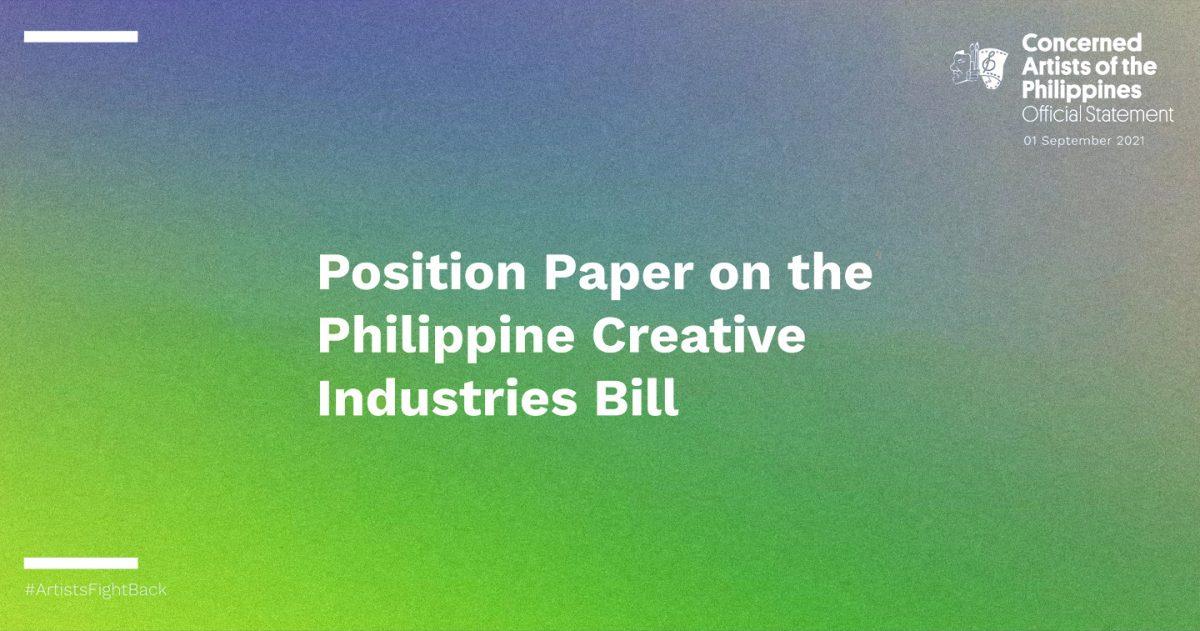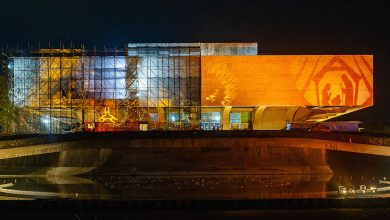MANILA, PHILIPPINES — Substitute House Bill (HB) 8101 is a bill that aims to improve and develop the creative industry in the Philippines. However, while the Concerned Artists of the Philippines and other local cultural organizations welcome this initiative, they have also voiced their various concerns regarding where the substitute bill, in its current form, falls short in protecting and recognizing important sectors of the community.
You can read their statement here:
We, the undersigned individuals and representatives of cultural organizations and formations unite in this response to Substitute House Bill (HB) 8101, currently lodged for Third and Final reading at the House of Representatives.
We welcome this urgent initiative from legislators, gaining ground during the past years, to respond to the needs of artists and other constituents in the Philippine cultural sector. The Eddie Garcia Act, filed and passed earlier in response to the tragedy of 2019 that underscored the need for policies to ensure protection of artists as workers, is an example of this changing policy landscape.
That the national contributions, rights, and socio-economic welfare of our arts and cultural workers have been generally and chronically undervalued and largely neglected by other policy-makers, government institutions, and the private sector over time is a reality that many colleagues have to contend with over the past decades.
Protection from precarity, nurturing the country’s creative labor force, and concretely realizing the Constitutional policy to support creative industries and arts are common directions that we unite on. The Covid-19 pandemic and the attendant economic recession also underscores the importance of protecting a sector controversially categorized as “non-essential” but whose labor, imagination, and production is actually vital to how society collectively informs itself, copes with, heals from, and prevails over the crisis.
HB 8101 recognizes and gives importance to the role of creative industries, particularly in the hopes of jumpstarting economic growth, and proposes a centralized infrastructure to lead, coordinate, plan, and implement economic and administrative programs that should lead to this goal. We see that this will be beneficial to key entities and top tiers of sectors covered in the broad range of industries covered by the bill.
The proposed law is an attempt to help address the situation but it is vital to first expressly integrate the recognition that creative industries are founded and sustained on tiers and classifications of creative labor: the largest of which is comprised of Philippine arts workers, ranging from individual creators to invisible laborers. These include freelance, self-employed, informal, wage, salary, and migrant workers who are not only the minds but also the hearts, hands, feet of these industries and who are the most dispossessed within these industries in terms of tenure, jobs, rights, and welfare.
We are for any policy that protects creative workers who give life to the industries, that upholds our collective capacity to assert economic, political, and civil rights and our welfare, and that works towards building creative industries for a national economy that is self-reliant and responding to local needs. We are for any policy that directly addresses the clamor for healthcare, protection, legal support, funding, education, and rights protection across fields of creative work.
The form of the existing substitute bill, however, has yet to integrate this recognition of creative workers’ needs and provide for cross-cutting industry safeguards. This is underscored, for instance, in the absence of key institutions such as the Department of Labor and Employment and other related agencies in the central coordinating body that the bill will create.
In response to these observations and in asserting the need for continuing consultation among arts and culture workers towards crafting pro-people policies, our formations have conducted a series of discussions with creative workers to continue engaging with our legislators. These discussions over July to August have yielded the following particular concerns which we bring forward to our legislators in the House of Representatives and the Senate:
LABOR STANDARDS AND WELFARE
Despite its acknowledgment of the importance of the creative industry, the bill overlooks the concrete needs of its most essential sector—the workers—and falls short on including provisions that ensure creative industry workers will benefit from their contribution to the national economy. The bill lacks provisions that will reiterate workers’ rights included in the Labor Code and international labor standards. The bill falls short in addressing the existing export-oriented, import-dependent economic structure that has condemned the country to cater cheap and docile labor for the needs of a global value chain as is evident in special economic zones. While the bill’s objectives of penetrating the global market of creative commodities may help boost the economy, it should do so without sacrificing workers at the altar of Transnational Corporations.
In terms of wages, the bill may not be favorable to individuals and small business entities since it neither fortifies the terms of payment nor addresses the wide income gap between industry entities. While other bills such as the National Minimum Wage Law and the Freelance Workers Protect Act are steps to address some of these concerns, the question of benefits remains unaddressed. There is also a need to assure workers a safe space in terms of legal aid and protection, safeguard their rights to organize and form associations, provide healthcare and psychosocial services, and stipulate provisions on maternity leave and childcare benefits while guaranteeing an equal income bracket for women. The bill should also assure the protection of creatives in light of the political landscape that vilifies artists through red-tagging. Furthermore, we must acknowledge that creatives are essential workers in the pandemic and thus provide additional benefits for lines of work that address the health crisis.
Such provisions for labor rights and welfare should also be all-encompassing, involving creative workers in the private sector, public sector, and freelance workers. Instead, we found the bill to be geared towards Business Support Organizations (BSOs) which do not necessarily include the representation of workers.
The challenge here is to recognize the priority of workers’ rights and their protection since they are the foundation of a robust and vibrant creative industry.
BUILDING LOCAL MARKET AND mSMEs SUPPORT
We found that the bill proposes flat incentives which could widen the discrepancy between established corporations and smaller players in the creative economy. Since the bill also favors “strategic investments” that will ensure the industry’s “competitive advantage,” it may indicate that the industry will favor established profit flows from bigger businesses as opposed to “risky” start-ups and mSMEs. Instead of flattening the economic resources and technical support needed by these players, the bill should safeguard local competitiveness that prioritizes mSMEs.
The production of creative work should benefit Filipinos. The bill’s focus on the export grossly overlooks the need to nurture local audiences and markets. This means that support should extend past commercial ventures towards non-profit creative practices and educational programs that build communities’ capacities to access, appreciate, and otherwise participate in creative industry efforts.
EDUCATION AND CAPACITY BUILDING
The prioritization of scholarships is a welcome move that may change the perception of the creative industry as a possible career option for students. However, the bill only provides for individual students instead of seeking the development of the student body at large. For the establishment of a national creative industry, a more inclusive approach that provides support to the student body and its organizations should be considered. Furthermore, the bill must ensure that support should be provided for educational institutions regardless of size or prominence.
Since the bill prioritizes digital and technology-based programs, equal support and opportunities should be funneled to the institutions in terms of equipment and resources. The inclusion of educational institutions for tax and finance incentives for materials and machinery related to the industry will help provide students the training they need.
Overall, the lack of provisions that focus on art education endorses an economism that limits industrial advancement to market-driven itineraries instead of pursuing a broader view of development. The bill needs to pay attention to the direction-setting capacity of education in arts and culture to ensure a humanizing agenda and expansive notion of art, culture, heritage, and creativity instead of predisposing production towards market demands and indexes, which limits the cultivation of real creativity. Thus, representation of art educators and students, and not just CHED officials and academic scholars, should be included in the Council to provide grounded insight on the educational sector and its needs.
INTELLECTUAL PROPERTY RIGHTS (IPR)
Since we found that the bill favors larger entities and investments, individual creators and smaller business entities are put at risk in terms of the protection of their IPR. It was recommended that the bill should stipulate the easier facilitation of IPR registration and ensure a system where rights violations are easily defended against. This would also entail a widespread and continuous education of creators on their IPR which includes accessible primers and other materials on the processes and contracts involved.
The bill must protect the economic advantages of the creatives’ IPR to empower and foster their creation, with priorities bent towards freelance workers and smaller business entities.
The scope of IPR should be also reviewed with an eye for measures that safeguard shared intellectual property against privatization and commercialization. Any expansion of IPR coverage should also be paired with measures that prevent companies from unfairly appropriating IPR of their employed creatives or of Philippine ethnolinguistic groups.
ACCOUNTABILITY, TRANSPARENCY, AND GRASSROOTS PARTICIPATION
It is important that the bill was able to recognize the necessity of mapping the industry and its primary needs, especially those in the rural areas. However, our consultations also recommended that a platform or mechanism should be in place to enable broader consultations that address the needs of all creative workers, regardless of sector.
The bill should include measures to ensure inclusive development for urban poor, indigenous, and other marginalized communities especially with regard to the formation of Special Economic Zones and Creative Cities that have historically led to displacement and dispossession.
It was also raised that in terms of the Philippine Creative Industry Council, the Presidential appointment of the majority of Council members may skew decisions against any creatives who take on contrasting political positions. Thus, the bill should create a mechanism that ensures a more democratic selection of Council officials instead of reproducing faulty patrón structures. Moreover, there is a need to adjust the terms of service of the Council to safeguard the continuation of long-term policy and programming instead of being tied to any particular presidential term.
We unite on forwarding these points to our policy-makers for action and look forward to uniting on the vision for a creative industry landscape that upholds the welfare of its workers.
SIGNATORIES
Concerned Artists of the Philippines (CAP)
Sama-samang Artista para sa Kilusang Agraryo (SAKA)
Tambisan sa Sining
Unyon ng Manggagawa sa Agrikultura (UMA)
Sining Kadamay (SIKAD)
Sandugo Alliance and Movement of Moro and Indigenous Peoples of the Philippines (Sandugo)
Ecumenical Institute for Labor Education and Research (EILER)
Concerned Artists of the Philippines – Bicol Chapter
Kurit-Lagting Art Collective
United Architects of the Philippines Student Auxiliary Area B District 5
Sorsogon Arts Council
FEU Communication Society
Langgam Performance Troupe
David Loughran
Karl Castro, artist and designer
Mark Estandarte
J.A. Sarmogenes
Franchesca Casauay
Ma. Teresa S. Jamias
Con Cabrera
Ilsa Malsi
Giano Ray C. Potes
Kwago
Czyka Tumaliuan
Adelaida Lim
Dorothea Maria M. Yrastorza
Ella Jamoralin
Siege Ledesma
Bambi Datar
Totep Perez
Rico Estrellado
Please click this link https://bit.ly/CI-Bill-SignatoryForm if you would like to add your name to the list of signatories.








